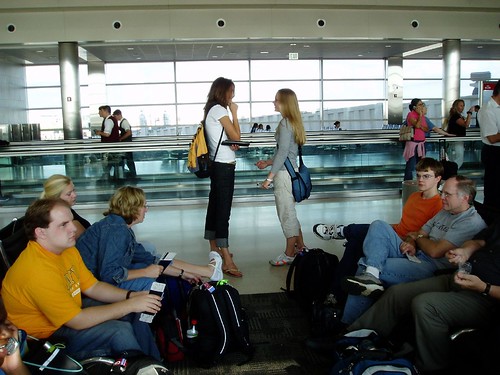A few
weeks ago, I wrote about my own rough layover: a very special
four-hour-two-toddler-post-bedtime-Detroit-airport night of magic. At one
point, I caught sight of another passenger at our gate reading magazines,
checking her phone, and enjoying an un-shared snack. Her calm, nonchalant
attitude was the perfect foil for my frazzled frustration. To see how well
someone else was handling a situation I was finding to be increasingly
unmanageable gave me...feelings. Feelings of inferiority. Feelings of jealousy.
Feeling incompetent to manage the way she was.
Through
the story of the Exodus, we see the people of Israel struggling with the
wilderness, with their own layover, while Moses maintains a deep faith and
close walk with God, trusting and seeking Him. If I had been an Israelite, I
imagine I may have felt my belief was inferior or incompetent compared to Moses’
titanic faith through the wilderness time.
 |
| Photo Credit: Flickr user Vanessa Vortex |
Many of the stories that we are comfortable and familiar with from
the Israelites time leaving Egypt and in the wilderness leave Moses looking
like he has super faith: patient in the waiting, taking his complaints to God,
leading the people to Him. Did God give Moses an extra dose of faith - like
everyone gets one nugget of faith, but Moses got a wheelbarrow full? Or is
there more here? Why does his time in the wilderness look so different from
everyone else’s? When I was younger, it seems (whether I heard my teachers
correctly or not) that people like Moses were held up as examples for us to
emulate because they were so impressive. The only problem is...I’m so not
Moses. I feel pretty regular, not very super.
In my own
life, in seasons of wilderness, I’ve run into people whose faith I admire, but
it seems somehow on a completely different level from my own. Sometimes when
I’m struggling my way through a layover season (complaining, demanding things
from God I just know I need, squirming under discipline instead of
learning), I talk with or hear about someone who is just Moses-ing it up in
their similar wilderness: joyful and hopeful while I’m angry and frustrated,
seeking God while I’m complaining, having peace while I battle. I admire their
faith, that deeper, closer walk with God and I wish I were the same. But, as
with Moses, I seem to ascribe their closeness to just a “better” faith, leaving
me attempting to pull myself up by my bootstraps and “do better.” The cynic
inside me has doubted that I would ever have a heart that seeks God the way
theirs does.
Pastor Dirk reminded us this week that Moses didn’t just show up
with this faith. Moses had already been in the wilderness, long before the forty
years he would spend there with the Israelites. He had already met God and
listened to Him in a period of life that wasn’t what he had intended or planned:
his own layover. I tend to only think of Moses as an uber-faith-person; I
forget that he was a murderer on the run, hiding and fearful, who needed to be
restored and matured. Yet God grew Moses in the same ways He would grow Israel
and that He grows us: in the layover, in the wilderness, in the waiting.
Over the
last few weeks, we've heard encouragement about these biblical seasons of
layover; but it's still hard to fight the feeling of just wanting to move on!
This week we talked about moving on - in God’s time.
When I'm
in a literal layover, I just want to get out; any plane to anywhere will do.
Right? When God has me in a life layover, I tend to feel the same: praying that
God would just end it, move me on, bring me to out of the wilderness and into
new things - any new thing will do. But instead of a quick exit, perhaps it’s
better to ask, “What is God showing me in this layover? How is He changing me?
Where do I need to grow? How can I seek God in this layover instead of trying
to hurry out of it?”
It’s in the wilderness that God trains and raises us up; it’s
where the Spirit matures us. Instead of growing cynical about my own slow and
immature heart when I encounter people who seem as faithful as Moses, I should
ask those very people the stories of where they have come from, and find
comfort in hearing how God grows us in the hard times.
When God invites me into the times of learning and waiting, I want
to find peace in waiting for Him to work in me. Am I learning, growing, letting
God shape and mold my heart?
God works
in our hearts in the layover, moving us from immaturity to maturity, from
slavery to freedom. There’s growth in the layover! When His purposes are
accomplished, He will tell us we have stayed long enough, and it’s time to move
on.
(Enjoy reflecting with the song Great Things by Elevation Worship!)
[Robin Bupp is married to Caleb, and they are from many places east of the Mississippi (but are calling Michigan home for the foreseeable future). A former high school science teacher, Robin is slowly turning the two Bupp kiddos into tiny nerds while they teach her lots of things, especially humility and patience.]


